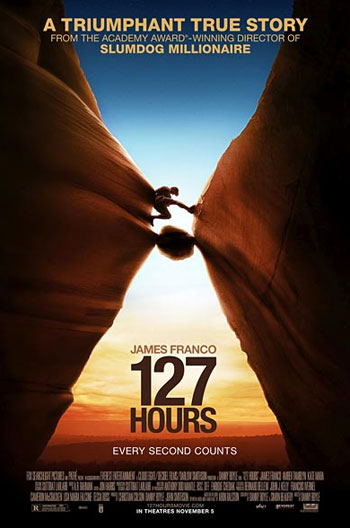LFF: 127 Hours – 4*
 An hour-and-a-half film about a man cutting his arm off to save his own life sounds like an intriguing concept alone. Coupled with the fact that said film is none other than the latest in Oscar-winner Danny Boyle’s (Slumdog Millionaire) arsenal and stars Golden Globe winner James Franco (Milk) should raise interest and awareness further. But what gives 127 Hours its immediate gravitas is the fact that it’s based on mountain climber Aron Ralston’s true story of courage.
An hour-and-a-half film about a man cutting his arm off to save his own life sounds like an intriguing concept alone. Coupled with the fact that said film is none other than the latest in Oscar-winner Danny Boyle’s (Slumdog Millionaire) arsenal and stars Golden Globe winner James Franco (Milk) should raise interest and awareness further. But what gives 127 Hours its immediate gravitas is the fact that it’s based on mountain climber Aron Ralston’s true story of courage.
Even with the serious and sombre subject matter, Boyle’s character shines through; a certain playfulness and carefree spirit that preludes the terrifying moment when all hope seems lost. Boyle incorporates as much of this in the rapid-paced editing at the beginning to show Ralston’s love of life and the outdoors. It’s like watching a fitness video or a travel programme without the voiceover, showing off the brutal landscape of Utah to its finest. When Ralston (Franco) meets two fellow explorers Kristi (Kate Mara) and Megan (Amber Tamblyn) Boyle wastes no time depicting more of the inviting terrain with its hidden pools.
The idea of an engaging script doesn’t seem possible, almost impossible, but what writers Boyle and Simon Beaufoy have done is move from action and dialogue to the psychology of Ralston, after the fall down the canyon. With the success of Buried starring Ryan Reynolds as a man in a coffin in 2010, it is possible to engage an audience in one location for the entire duration of a film. But the camera in 127 Hours often zooms out of the canyon to escalate the tension and urgency of the situation, as well as Ralston’s complete isolation, and it’s exhilarating stuff.
Franco is exceptionally well cast. Fit, intelligent, boisterous and passionate, he embodies Ralston’s highs and lows and leads us through the whole ordeal with more humour than you might first think in such a film. In fact, mirroring Boyle’s lust for life, Franco keeps us rooting for Ralston, seeing him never as a victim but as a survivor who reconnects with society in the end.
Boyle’s cinematography also never allows for us to get complacent either, and this prevents the film from becoming an ordeal for the audience to sit through. The grizzly moment is kept brief – even with CSI-style internal body shots of scraping bone and ligament. Indeed there is very little titillation involved; it’s all very tastefully done, clinical and surgical in the manner it’s shot.
127 Hours is a prime example of good writing, directing and acting in a film, where little happens, but a lot of human experience and emotion transpire. It also has action and fantasy where you least expect it. It is very individual, smart and economical in its depiction, and above all, positive in its outlook that makes it an ultimately inspiring and compelling watch.
4/5 stars
By L G-K